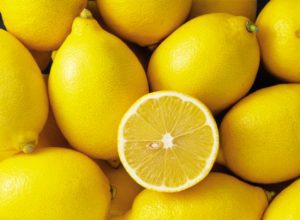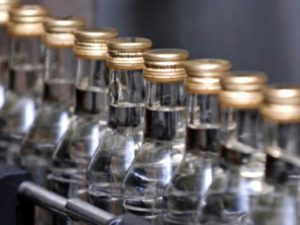
Lemons could disappear from the shelves of Ukrainian supermarkets in the middle of April due to the closure of the Turkish market and possible difficulties with supplies from Spain, Development Director at the Ukrainian Horticultural Association Kateryna Zvereva has said.
“Ukraine imports annually around 55,000 tonnes of lemons (54,300 tons in 2019). Deliveries from Turkey account for more than 60% of the total. Due to the closure of the Turkish market, products from this country will be replaced by products from South America (Argentina is second largest supplier of lemons to Ukraine after Turkey), “she told Interfax-Ukraine.
According to Zvereva, in the middle of April, a situation when consumers will not be able to find lemons on the shelves of Ukrainian supermarkets may arise.
“Deliveries of lemons from Turkey are limited due to the closure of the market. Deliveries from Spain are also a big question (due to the strong spread of the coronavirus disease COVID-19 pandemic in the country). And lemons from Argentina simply will not have time to reach the country by sea physically,” the expert said.
The development director of the Ukrainian Horticultural Association said that lemon prices have doubled over the past month. At the beginning of March, the average price was UAH 40-45 per kg, now it is UAH 80-90 per kg.
“Now it’s difficult to predict the price increase as the situation is developing rapidly and it is not clear what will happen tomorrow. But, it’s also worthwhile to understand that Turkish lemon is the cheapest. If the consumption level does not change, it is likely that the price of lemon may increase and reach over UAH 100,” Zvereva said.

The initial registration of electric vehicles in Ukraine (new and used) in January-March 2020 increased by a third compared to the same period in 2019, to 1,700 units, Ukrautoprom reports. At the same time, in March, registrations of passenger cars fell by 16%, to 386 units, and commercial vehicles by almost 40%, to 23 units.
“Such a drop in registrations in the electric car market is due to the fact that its lion’s share is formed by used cars imported from abroad, the registration of which was suspended in the middle of last month due to quarantine,” the association’s press service explains.
At the same time, the share of imported used cars in March registrations of electric cars amounted to 86% (333 units), while in the commercial segment all 100% (23 units).
At the same time, Ukrautoprom draws attention to the fact that, despite all the restrictions due to quarantine measures, registrations of new passenger electric cars in March increased by 36% compared to March 2019, to 53 units.
The undisputed leader in the electric car market remains Nissan Leaf: last month 129 cars of this model (all used) passed Ukrainian registration.

State-owned enterprise Ukrspyrt has supplied Ukrainian producers of sanitizers with almost 300,000 liters of disinfectant on April 2-5. “Over a short term we have supplied producers of sanitizers with around 300,000 liters of disinfectant. We have relevant contracts with 32 Ukrainian companies,” the press service cited Acting Director General of Ukrspyrt Serhiy Bleskun.
He said that cooperation with producers of sanitizers and medical institutions is a priority task for the state enterprise in April, while other directions go next. On April 2-5, Ukrspyrt shipped 300,000 liters of disinfectant to the following companies: MDM LLC, Aqua Cosmetics Group LLC, BKHIM LLC, Advent Invest LLC, Ecoplant LLC, private company Alliance of Beauty, private company Pharmstandard, Astra-Cosmetic LLC, Win Stream LLC, Difrano Union LLC.
Bleskun said that Ukrspyrt provides producers of sanitizers, which have worked with retailers in the Ukrainian market before and have relevant production plans for the production of sanitizers in various volumes, with raw material.
As reported, on March 30, the Verkhovna Rada of Ukraine adopted bill No. 3275 amending some legal acts aimed at ensuring additional social and economic guarantees in connection with the spread of coronavirus (COVID-19), which, inter alia, permitted Ukrspyrt to produce disinfectant (raw material for sanitizers) at its plants.
Ukrspyrt will produce disinfectant at its enterprises until April 30.

Kvass Beverages plant (Zaporizhia), the manufacturer of non-alcoholic drinks, which belongs to Ascania group of companies, adapted part of the production capacity for the production of disinfectants. According to the company’s statement on Monday, April 6, the first batch of disinfectants will be transferred to medical institutions in Zaporizhia.
“Given the critical situation with the supplies and production of disinfectants in Ukraine, we decided to reformat as soon as possible some of the equipment for the production of disinfectors in order to support efforts to combat coronavirus (COVID-19) spread,” owner of Ascania Group Valeriy Horban said in a statement.
Now the company is working on the organization of continuity and non-stop production process of disinfectant concentrate. The output of disinfectants was launched in early April.
Kvass Beverages is one of the largest producers of kvass, cider and other soft drinks in Ukraine. Its capacity is 4 million liters per month.
Ascania Group unites 12 companies. Among the areas of activity are import, production and distribution of food products, processing and export of honey (five types, about 30 SKU), logistics services, electricity supply, production of small arms, security and training services for security personnel of private and public structures, agriculture (growing roses).
The group has offices throughout Ukraine, offices in Berlin (Germany) and Guangzhou (China). The total number of Ascania Group employees is more than 2,500 people.

The American Chamber of Commerce in Ukraine (the Chamber) has been actively involved in the process of discussing changes to the labor law from the outset, providing comments and suggestions, and sharing the views of member companies’ experts. The Chamber Human Capital Committee regularly organizes meetings with representatives from political parties, government agencies, and institutions to discuss changes to the labor law. Also, the Chamber member companies’ experts are involved in activities of the working group of the Parliamentary Committee on Social Policy and Veterans’ Rights.
The Chamber members believe that the current labor legislation should be reformed, as the Labor Code, which is the main legislative act governing labor relations, was adopted in 1971. The Chamber has been actively working on the Draft Law #2708 that was recently withdrawn. It had to be revised, but at the same time, it could liberalize the excessively regulated labor law and make labor relations more flexible. Labor law reform will give businesses much more flexibility to retain current employees and quickly hire new employees.
The most relevant changes that need to be introduced to the legislation identified by the Chamber member companies’ experts include:
Reducing the state pressure and creating opportunities for employers and employees to decide the conditions of employment independently;
Introduction of electronic form of employment contract followed by the cancellation of employment records;
Regulating the types of involvement of third-party employees – outstaffing and outsourcing at the legislative level;
Updating regulations on material liability to meet the present-day demands;
Settlement of labor disputes;
Regulation of employment terms and conditions in the situation of country-wide lockdowns or other forms of restrictions that significantly influence business activity.
The situation with COVID-19 pandemic has also revealed gaps in the existing regulation that need to be addressed urgently to contain the spread of the virus and, at the same time, to keep the business working safely and effectively. The new flexible and distant ways of working shall be recognized and established on a legislative level. We now see that the digitalization of processes is not only a good initiative but a critical need nowadays.
Experts of the Chamber member companies are convinced that the liberalization of the labor legislation will help to create equal rules on the labor market as it will balance the interests of employees and employers. It will also provide incentives for business development, simplify entry-exit from labor relations in combination with effective mechanisms of protection against sudden loss of work, looking for a new job, and reducing unemployment. All these things will contribute to the development of the Ukrainian economy at large, increase investment inflow and business competitiveness.

The mobile communications operator lifecell, under the April Unlimited social promo, has provided subscribers with individual tariff plans with fees of more than UAH 100, with an ability to communicate without restrictions using voice calls to all numbers within Ukraine, namely, lifecell, fixed lines and mobile operators during quarantine.
According to the terms of the promo action, from April 3 to April 30, subscribers who have a package of services that costs UAH 100 and more, after paying for it, will receive unlimited calls to all numbers within Ukraine (fixed line, mobile, other networks and lifecell) for the period of validity of the service package starting from the day of the fee payment.
Under the terms of the promo action, starting from 101 promotional minutes, the duration of each call will be three minutes. However, the number of calls is unlimited.
“This restriction is introduced to prevent the use of unlimited calls for commercial purposes by individual subscribers, which may complicate or make it impossible to provide services to subscribers,” lifecell said.
To use this offer, the subscribers do not need to activate or connect anything else – they just have to pay their current tariff plan service package fee during the period of offer validity. This offer now covers more than 30 active lifecell tariff plans.
For users, whose tariff plan service package less than UAH 100, the operator launched the Advantageous Hundred promo, under which the subscriber can purchase 100 minutes for UAH 15 for four weeks of calls within Ukraine to fixed lines and other mobile operators. The number of purchases during the promotion period is not limited.
“We noticed that since the introduction of measures aimed at combating the coronavirus disease (COVID-19) spread, our subscribers began to make more traditional voice calls. Today, more than ever, it is important to stay in touch with family, maintain remote working communications and have the opportunity to consult if necessary with doctors, and it is important that Ukrainians do not feel the barriers that are familiar to them, which are traditionally determined by the high cost of calls to networks of other operators or fixed lines compared to unlimited calls within the network. That is why lifecell granted more freedom of communication for its subscribers with calls to all other networks amid quarantine,” Chief Executive Officer of lifecell Ismet Yazici said.
Both promo actions are valid for all users with individual tariff plans, but do not cover the operator’s corporate subscribers.
The April Unlimited promo does not apply to the Crazy Year, HandMade and Self-Made tariff plans, while users of these tariff plans can activate the Advantageous Hundred promo.